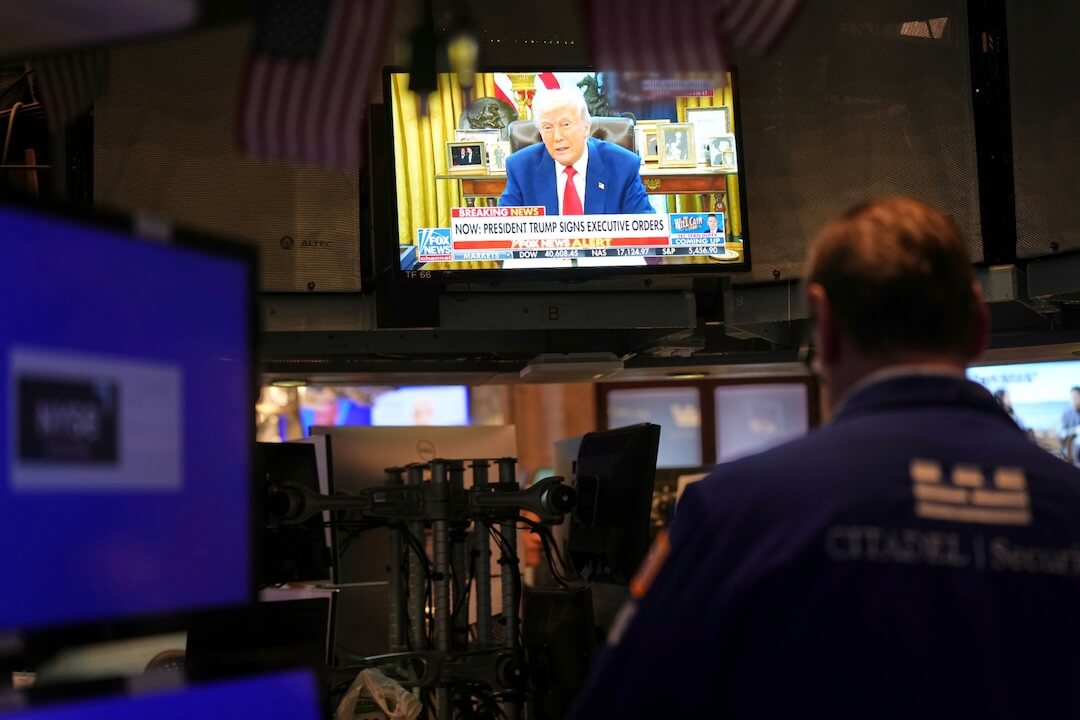Compared to covering the White House or federal agencies, Congress is like a joyous romp through a 1960s toy store stocked with Mattel's pull-string Chatty Cathy dolls.
You never know what they'll say, as this mini-classic black-and-white TV commercial back then put it. But most will say something, unless they're among a media-averse minority, such as Sen. Elizabeth Warren (Say "Good morning!" and she may duck down the nearest stairwell).
Among the several thousand elected officials and staff, you can buttonhole folks and most will gab. Maybe it's "off the record" or "on background," but they'll jabber, with expertise to be found (in some office or hearing room) on virtually any topic.
It's partly why those on the actual beat tend to possess the best take on what might play out in Congress during crucial moments. They don't have a monopoly on wisdom, especially during these fluid (or confusing) days of Trump. But they're more informed than a lot of cable TV pundits, who may wing it on issues as diverse as North Korea, domestic infrastructure spending and The Wall, often manifesting an air of certitude at odds with their actual knowledge.
So here's a primer on what one might expect from some of the many smart journalists who ply their trade in covering an important universe of big stakes, bigger egos and a sometimes collective aversion to legislative courage. And, in some cases, they respond to the question of what they'd crave to know if they had a crystal ball.
It may serve as a reminder of the range of important matters confronting our elected officials, whether or not they choose to take constructive action on many. Print it out and you'll be up to speed about what's up at perhaps the world's most famous legislative body.
Kasie Hunt, correspondent, NBC News: “If I had a crystal ball – I’d love to know whether the relationship between President Trump and Senate Minority Leader Chuck Schumer keeps getting stronger or quickly starts to fray. I think that could determine a lot in how the major priorities unfold: infrastructure, tax reform, etc. If the president continues to trust and work with Schumer, I think the year could unfold much differently than if the president concludes Schumer can’t help him.”
“If I had a crystal ball – I’d love to know whether the relationship between President Trump and Senate Minority Leader Chuck Schumer keeps getting stronger or quickly starts to fray. I think that could determine a lot in how the major priorities unfold: infrastructure, tax reform, etc. If the president continues to trust and work with Schumer, I think the year could unfold much differently than if the president concludes Schumer can’t help him.”
Bob Cusack, editor of The Hill: "Issues to watch are tax cuts and immigration. Trump has pivoted to working with Democrats now and that probably helps his chance of getting immigration done, though it's an uphill battle. On tax cuts, I don't see any agreement between Trump and Democrats."
"Issues to watch are tax cuts and immigration. Trump has pivoted to working with Democrats now and that probably helps his chance of getting immigration done, though it's an uphill battle. On tax cuts, I don't see any agreement between Trump and Democrats."
"Another one to watch is the decision Trump has to make on Obama's Iran deal, as well as whether to fund the government by end of year and possibly raise the debt ceiling. The wild card is any news on the Supreme Court, and somebody steps down, which would be a huge thing, especially in an election year."
"I'd love to know whether Trump and the Democrats can have a happy marriage. They're in the honeymoon phase now and could work on transportation early next year. That is a very big question: Can they work together on some issues, not others? Will Democrats and Trump be able to work together when the left and right are so strong and resist anything that looks like a compromise? The liberal base and conservative bases could balk at compromises on immigration, tax cuts and transportation. Conservatives don't want a big transportation bill and Democrats don't want too much border on an immigration bill."
Richard Rubin, correspondent for The Wall Street Journal: "1. How determined are Republicans to get something done? They're divided on the big picture of budgets and the small-bore details of taxes. Can they set that aside because of the political imperative of acting?"
"1. How determined are Republicans to get something done? They're divided on the big picture of budgets and the small-bore details of taxes. Can they set that aside because of the political imperative of acting?"
"2. When will Republicans show the details? Details are needed in a tax bill, and they're important. But they also clarify opposition."
"3. How will the business world react? This is an important part of the Republican coalition. Retailers weren't shy about fighting border adjustment earlier this year. What will big and small companies do if the bill isn't what they've dreamed about?"
"4. Is the president a constructive or disruptive force for Republicans? This week, he said high-income households wouldn't get tax cuts. Following through on that would require major changes in the plans."
"5. Can Democrats get involved? What price will Democrats — both the main group and the moderates the president has met with — set as their condition for engaging on a tax bill and potentially voting for it? And will Republicans be willing to pay it?"
Jonathan Salant, Washington correspondent for NJ.com and the Star-Ledger: "Lawmakers will try to draft legislation to allow the Dreamers to stay now that President Trump has revoked his predecessor's executive order. There will be another request for hurricane aid. They may begin work now on spending legislation to keep the government open past December, when the current temporary funding bill expires. They also will need to raise the debt limit."
"Lawmakers will try to draft legislation to allow the Dreamers to stay now that President Trump has revoked his predecessor's executive order. There will be another request for hurricane aid. They may begin work now on spending legislation to keep the government open past December, when the current temporary funding bill expires. They also will need to raise the debt limit."
"They also will work on legislation setting defense policy for the next 12 months, an annual bill known as the National Defense Authorization Act. Subjects of debate on that bill will include President Trump's decision to prevent transgendered individuals from serving in the U.S. Armed Forces."
"For me, one focus will be on tax reform. Congressional Republicans are trying to pass a budget resolution that will allow them to bypass Senate Democrats and pass tax cuts with only 50 Republican votes, allowing Vice President Mike Pence to break the tie. That's the procedure the GOP used in 2001 to pass the Bush tax cuts, which erased the budget surpluses that President Clinton had bequeathed the Republicans."
"Both President Trump and House Republican leaders are calling for the elimination of the federal deduction for state and local income and property taxes, which would penalize high-tax states like New Jersey, New York and California, which tend to support Democrats in national elections. That effort will be much harder if they had to get 60 votes to pass a tax bill, especially since the top two Senate Democrats come from New York and Illinois. Republican lawmakers in the states most affected by the loss of the deduction have enough votes to block the budget resolution. It remains to be seen if they will play hardball and demand that the loss of the state and local tax deduction be taken off the table as the price for voting yes."
Phil Mattingly, correspondent, CNN: "Tax reform. Won’t get done in the next two months, but both the long-awaited top-line details (in a week or two) and the actual Senate and House bills (October) will officially see the light of day. It’s a huge, heavy lift, as any Hill vet will tell you (there’s a reason it hasn’t been done in 31 years), but it’s easy to hem/haw/forecast/predict/talk down with no details on the table. The details, laying bare every ox gored and every interest group wronged, will be the first real view into where this may all end up."
"Tax reform. Won’t get done in the next two months, but both the long-awaited top-line details (in a week or two) and the actual Senate and House bills (October) will officially see the light of day. It’s a huge, heavy lift, as any Hill vet will tell you (there’s a reason it hasn’t been done in 31 years), but it’s easy to hem/haw/forecast/predict/talk down with no details on the table. The details, laying bare every ox gored and every interest group wronged, will be the first real view into where this may all end up."
"Immigration. The president put this issue on the table himself with his decision to rescind DACA in 6 months. There is significant interest in dealing with this in both parties before the deadline. But the details are tricky here. Meetings between parties/players are already starting, and they’ll continue in earnest in the weeks ahead. Expect a deal with significant border security provisions (but no explicit wall funding) in exchange for protection of DACA participants. But the scope of that protection is huge for Democrats and, it goes without saying, but it’s a very thorny political and policy issue inside the GOP and won’t be a problem solved quickly."
"Spending deal parameters. The can may have been kicked, but preliminary talks should launch into gear in the weeks ahead over how to fund the government post-Dec. 8. The fights here are real, visceral and almost certain to threaten a shutdown before Christmas. Efforts in the weeks ahead to massage those rocky areas (think border wall funding, budget caps, military spending and no shortage of politically fraught policy riders) will go a long way to determining whether the government continues to operate smoothly … or halts to operate (for a period of time at least) altogether."
"Bonus to keep an eye on: Section 702 reauthorization. This is the FISA law program related to intel collection that has come under major scrutiny post-Snowden, and it doesn’t expire until December, but this is bubbling big under the surface right now. Privacy advocates want major changes and … so do many members of Congress. The Intel community says it’s crucial to its efforts. The Trump administration desperately wants it reauthorized. Last time around it was a relatively painless reauthorization process. This time won’t be. It will be a huge – and fascinating – fight."
Cristina Marcos, staff reporter, The Hill: "Republicans are sprinting to see if they can push a bill to repeal the healthcare law before the end of September. After failing to fulfill a seven-year campaign pledge for most of this year, it’s the GOP’s last chance before the budgetary rules used to avoid a Democratic filibuster expire. But rushing before the expiration date comes at a cost: Lawmakers wouldn’t know the full impact of how the proposal from GOP Sens. Lindsey Graham (S.C.) and Bill Cassidy (La.) would affect the nation’s health care system."
"Republicans are sprinting to see if they can push a bill to repeal the healthcare law before the end of September. After failing to fulfill a seven-year campaign pledge for most of this year, it’s the GOP’s last chance before the budgetary rules used to avoid a Democratic filibuster expire. But rushing before the expiration date comes at a cost: Lawmakers wouldn’t know the full impact of how the proposal from GOP Sens. Lindsey Graham (S.C.) and Bill Cassidy (La.) would affect the nation’s health care system."
"Before the Graham-Cassidy proposal gained steam, Republicans were inclined to move on from the failed Obamacare repeal effort to tax reform. GOP leaders and the Trump administration have set a goal of finishing work on tax reform by the end of the year. Of course, Speaker Paul Ryan (R-Wis.) initially hoped to send an Obamacare repeal bill to Trump’s desk by the end of his first 100 days in office — and look how that turned out. "
"So don’t be surprised if Congress isn’t able to enact tax reform for the first time in 30 years by Christmas. But Republicans hope they can at least make some progress in the next couple months."
"Democrats, meanwhile, are hoping they can make a breakthrough with Trump on protecting young undocumented immigrants from deportation. The Trump administration is phasing out the Deferred Action for Childhood Arrivals (DACA) program through March, but Democrats hope they can take care of it earlier than that."
"Watch for divisions in both parties when it comes to this issue. Republicans range from centrists who support allowing the so-called Dreamers stay in the U.S. to conservatives who want tougher immigration enforcement measures. And Democratic leaders dealing with Trump will have to manage the factions of their own: liberal members of the Congressional Hispanic Caucus in particular are adamant that any deal should grant immigrant youths a path to citizenship, without additional border security measures that might appeal to immigration hawks."
Seung Min Kim of Politico, a Hill reporter:  "Immigration reform has lived and died a hundred deaths, but – at least recently – has never faced a deadline. But now it does, and I’m curious to see whether a Republican-controlled Capitol will ultimately pass legislation that establishes a pathway to citizenship for young undocumented immigrants who came here as minors."
"Immigration reform has lived and died a hundred deaths, but – at least recently – has never faced a deadline. But now it does, and I’m curious to see whether a Republican-controlled Capitol will ultimately pass legislation that establishes a pathway to citizenship for young undocumented immigrants who came here as minors."
"Long publicly conflicted over the fate of these so-called Dreamers, President Trump said he’ll kill the Deferred Action for Childhood Arrivals program in six months and kicked the issue to Congress to figure out. There’s a reason even Democratic-led Congresses have struggled to pass smaller pieces of immigration reform like the Dream Act: Immigration is hard. But in talking with GOP lawmakers this time around, I’ve discovered that support for these so-called Dreamers, even among conservatives, runs deeper than one would initially think."
"During the 2013 debate, I kept a running list of Republican lawmakers in a lengthy Word document on where they stood on a pathway to citizenship for undocumented immigrants. The House never voted on a bill, but this time around, they may have no choice."
Karoun Demirjian, national security specialist, The Washington Post: "What's going to be key is watching which direction the Russia investigations go into. Senate Intelligence Committee Chairman Richard Burr has set for his panel the ambitious, 'aspirational' deadline of finishing by the end of the year. If he is to meet it, it's going to mean a flurry of interviews, and even public testimony, with Trump's inner circle in October and November. Senate Judiciary is by no means on the same timeline — but they too will be influenced by the pace of the Intelligence committee. Plus they're still looking closely at the conduct of former FBI Director James Comey and former Attorney General Loretta Lynch over the Clinton emails."
"What's going to be key is watching which direction the Russia investigations go into. Senate Intelligence Committee Chairman Richard Burr has set for his panel the ambitious, 'aspirational' deadline of finishing by the end of the year. If he is to meet it, it's going to mean a flurry of interviews, and even public testimony, with Trump's inner circle in October and November. Senate Judiciary is by no means on the same timeline — but they too will be influenced by the pace of the Intelligence committee. Plus they're still looking closely at the conduct of former FBI Director James Comey and former Attorney General Loretta Lynch over the Clinton emails."
"Why do the Russia probes matter, if they're not really legislative — and Congress can't push Mueller where he doesn't want to go? Because they set a tone in the Capitol about tensions — or lack thereof — between lawmakers and the administration on the other end of Pennsylvania Avenue. Lawmakers that don't trust Trump in one realm may feel freer to push back on him in other policy areas. And oh yeah: There's a little thing called the midterm elections coming up in 2018, and we've already seen that the president does not shy from endorsing the opponents of members that are rankling him."
"But beyond that, there is a hefty legislative agenda Congress may have to tackle — many items depending on what moves the president makes in the international arena. One big thing to watch is North Korea sanctions. The country and the UN Security Council may be taking unprecedented steps to sanction Pyongyang, but it isn't enough for many members of Congress, who want to see Iran-style sanctions — I'm talking the 2010 and 2012 measures — imposed against the hermit Kim regime."
"Precedents are important with sanctions, but North Korea's a tricky situation — the government doesn't operate like Iran (which desperately wanted to be back as an economic player in the global world order) or former Soviet Union (that was a rivalry between mismatched but competitive superpowers). The rank and file in Congress is itching to slap harsher measures, even if the U.S. has to go it alone, as a way of showing the world how serious America is about corralling Pyongyang's nuclear ambitions. It's congressional leaders who have so far held them back, in deference to the administration navigating a difficult and high-stakes crisis — but their patience may not be infinite."
"Iran is also potentially going to hit Congress in a few weeks — if the president decides not to certify the Iran deal. Trump has got to make the call of whether the thinks Iran is in compliance with the nuclear deal that went into effect in early 2016. If he says yes, they are, then that's it — things toodle along. But if he says no, that kicks off a 60-day window in which Congress has to make a hard call: Do they reimpose the nuclear sanctions, thereby effectively ripping up the Iran deal and putting Tehran back on track to be a nuclear power, or do they let the Iran deal stand, thereby exposing themselves to political blowback on the campaign trail? Because let me say that number again: 2018. 2018. Midterms are coming."
"The defense bill hasn't grabbed headlines this year like in years past, when Obama was threatening (and sometimes making good on) vetoes, and lawmakers were fighting tooth and nail over whether to dip into war funds to cover the costs of regular Pentagon operations in order to operate within budget caps. The House and the Senate versions both sailed through their votes. Bipartisanship is reigning, and members are very proud."
"But now we head into the conference period [she refers to the process whereby House and Senate members seek to reconcile differences in their two versions] — and into the period of budgeting. Because you can pass a $700 billion defense authorization bill, hiking spending dramatically above where it has been — but if you can't pay for it, you've got to start renegotiating the whole thing."
"Members of Congress have been promised, and promised, and promised again, that there will be a vote on a new authorization for use of military force against extremist groups, at least in the Senate Foreign Relations Committee. It has yet to materialize. The administration doesn't want it to come up. But it's been years now since lawmakers started objecting that the existing 2001 (which we used to go into Afghanistan) and 2002 (which approved operations in Iraq) AUMFs do not provide a sound legal footing for fighting the Islamic State. Still, it's going to be a hard slog to get hawks and doves to agree on just what to authorize the military to do — and for how long. So that should be a testy one."
Again, print this out. You may have to run to Office Depot for more printer paper and cartridges. But you'll know as much as House Speaker Paul Ryan and Senate Majority Leader Mitch McConnell. Or nearly as much. That's not bad.






